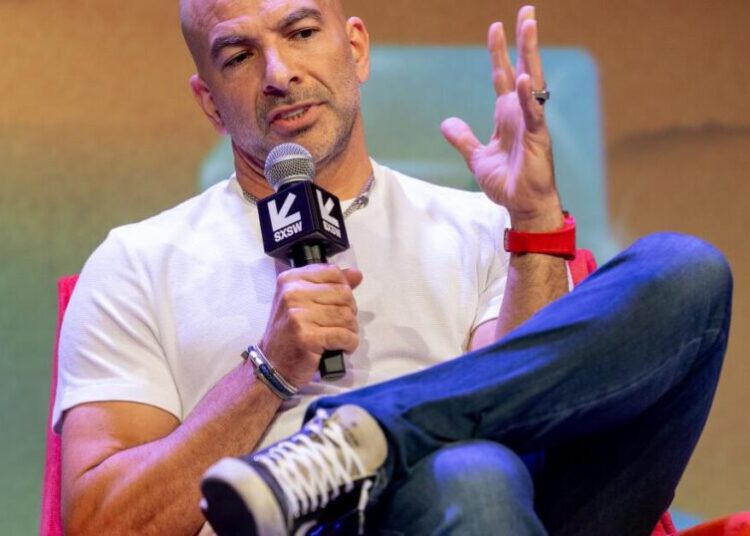The last time I heard Chris Whitley in person was nearly 22 years ago, when he performed a solo show at Jammin’ Java in Vienna, Virginia. It was a cold February night, and Chris wasn’t helping with his lonely stomp-box-and-steel-guitar arrangements. His performance felt restless, sometimes mechanical, as if searching for a spark to reignite songs that were little more than dying embers in his head.
Two moments stick in my mind with something approaching clarity: For some reason, Chris started fielding requests, even for songs not by his own hand. I shouted out “Pancho and Lefty,” the elliptical Townes Van Zandt yarn that I suspect appealed to Chris’s outlaw sensibilities. He perked up for a second, launched into the song but stopped halfway through because he couldn’t remember the lyrics. I’ve held onto this memory for 20 years like a keepsake, yet I find no mention of his fumbling, half-finished “Pancho and Lefty” in an archive of that night’s performance. I swear I’m not making this up.
The other moment came after the show. Fueled by equal parts alcohol and nostalgia for my time as a music writer in Houston, I approached Chris and tried to strike up the kind of conversation we’d had years ago. He was kind, if slightly manic, but his eyes were wide and hollow in his gaunt frame. He seemed as if he had sunk deep into himself, untouchable by those living on this plane.
I would never see Chris again.
He died of lung cancer less than two years later, on Nov. 20, 2005, in Houston, the place of his birth. He was 45. Many of his fans were shocked, but those who knew him were not surprised. He lived close to the ground, flew close to the sun, seemingly unconcerned by the dangers each presented. Friends and colleagues, it seemed, were always worried about the lifestyle he led. They listened to his music not just for pleasure but for clues to the demons that sought to control him.
Two decades have passed since Chris’s death, and his music — almost mainstream, long a cult fave — has moved further into obscurity with each passing year. Chris’s gradual irrelevance feels like the kind of indifference that comes from a generation or two that never fully grasped, let alone supported, a great artist whose moment in the spotlight was cut short. My hope is that time has not fully passed him by — that perhaps America can rediscover Chris Whitley and come to love this dirty angel with the otherworldly voice.
I was an evangelist for Chris even before his death, but it’s a complicated gospel to preach. Without proper guidance, the unconverted may first reach for “Din of Ecstasy,” Chris’s 1995 sophomore album that flirted with dissonance, feedback, drug culture and maybe even madness. This is not the place to start your journey; it’s like trying your hand at abstract algebra when you haven’t mastered even basic math. “Din of Ecstasy” rewards only the most dedicated listeners.
The better place to start is “Living With the Law,” his 1991 debut on Columbia Records that introduced Chris to audiences around the globe.
It was an album that felt lived in, bottled straight from his own life. As a boy, he lived in Houston, Dallas, Oklahoma City and Weston, Connecticut, before his parents split up, and he, his mother and his siblings relocated to a Mexican border town. Chris apparently dropped out of high school to start life anew in New York, where he busked on the sidewalks and played Bleecker Street clubs for chump change. He eventually moved to Belgium, where he married, had a child and performed with his wife, Hélène Gevaert, in the band Noh Rodeo. He returned to Manhattan, soon to be discovered by the recording industry, which launched a bidding war over his ability to channel the blues through his idiosyncratic lens.
Chris had crossed over into his 30s by the time “Law” was released, and the album synthesized his many influences — the raw electricity of the blues, the metaphor-rich verse of Bob Dylan, the nomadic isolation of his childhood — into a singular, hard-to-classify sound. Reading the reviews from the period reflect the difficulty of the task: Critics call his music fantasy blues, country blues, truck stop rock-and-roll, blues-drenched rock, even a “front porch bluesy sound” in notices that were generally very favorable and sometimes outright gushing.
I was one of those fawning critics when I was employed at the Houston Post, another major influence on my life, likewise gone too soon. “His stark, dark, and alienated Southern-fried blues feels like driving down a dusty country road at night … with no headlights,” I wrote in August 1991 in a review that you cannot access online. Not my best work, but it painted a picture.
It’s difficult to divorce “Living With the Law” from its time. In the summer of 1991, the pop charts were awash with frothy things from EMF, Paula Abdul, Bryan Adams, Amy Grant, Lenny Kravitz and DJ Jazzy Jeff & the Fresh Prince. Compared to this ear candy, “Living With the Law” sounded like it crawled out of hell. Chris’s lyrics were grim, even on his single “Poison Girl,” its pop-rock rhythms concealing a much heavier tale:
I be waiting uptown
While she gone underground for a ride
I be waiting uptown
While she passes some trick on the side
The rest of the album spoke of death, love and the afterlife; apparitions passing through prison walls; and the casual cruelties of romantic relationships. Malcolm Burn’s production made all this Sturm und Drang palatable by borrowing the wide-open atmospherics employed by his mentor, Daniel Lanois (then celebrated for his work with Brian Eno for U2), whose home studio in New Orleans served as the site for this recording session. Despite its acclaim, though, “Living With the Law” was built on an empty promise: With its polish, the record was a warped reflection of how Chris saw himself, as I learned by reading the superb Substack All Things Chris Whitley, founded by Sandra Dewitz, who goes by Katie.
A retired professor and administrator at San José State University, Katie jumped on the Chris bandwagon years after many others had found it too bumpy and uncomfortable; she messaged me recently. She first heard Chris in the late 1990s while driving home from a conference in Big Sky, Montana. Perhaps not surprisingly, “Big Sky Country” came over the radio; two years later, she finally looked up the song, learned about its songwriter and has been devoted to his work ever since. Her newsletter, which evolved out of her earlier work on other platforms, delves deep into the history of Chris’s albums, his guitar tunings, even his love life.
Katie’s project is illustrative of the effect that Chris’s music has on people, even now. His major-label recording career lasted only six years, spanning three albums. He moved to independent labels, where his music continued to challenge listeners. He released one genuine masterpiece, “Dirt Floor,” a 1998 solo work recorded in a single day at a Vermont farmhouse owned by his father. The title track may be a meditation on death, or it may be a metaphor about grounding yourselfin what’s important. Either way, the song will rip your guts out.
Those who have spent time with Chris’s catalogue — including “Rocket House,” a mesmerizing scratch-and-riff, techno-rock collaboration with DJ Logic on Dave Matthews’s ATO label — tend to fall hard for it. Take Matthews, who once told Billboard, “Honestly, I feel more passion for his music than I do for my own. My music I’m critical of. But I have a fervent, religious devotion to the magic that Chris makes.”
But the testimony that hits me hardest is a quote from Vernon Reid, the guitarist and founder of Living Colour. He’s interviewed as part of “Dust Radio,” a 2017 documentary that digs into the legacy of Chris. Reid looks directly at the camera and says, “His music?” He pauses, then tilts his head down to stare up from under the brim of his straw fedora, as if to make sure you understand the seriousness of his point. “His music? He’s one of the greatest ever for me.”
These devotees are responding, I think, not just to Chris’s songs but to his tunnel-visioned commitment to his craft. That was the lesson Chris seemed to learn from “Living With the Law.” He would never compromise again, a trait he might have absorbed from his mother, a sculptor. As he says in a clip in the documentary: “If I try to compromise, it’s just creative suicide. I lose whatever I actually have.” His fidelity to his art no doubt cost him more than he could measure: success and money, for sure, but perhaps something less tangible, too, such as peace. His zeal has certainly been passed along to his daughter, Trixie, a fine musician in her own right.
My involvement with Chris’s life, as tiny and tangential as it was, came full circle when he died. After his death, his caretaker reached out to the Musicians Benevolent Society of Houston, a small nonprofit that provided assistance to musicians who had fallen on hard times and couldn’t cover their rent, utilities, prescription drugs or other small bills. I was then a board member of MBS, and together we voted to provide $1,000 to help cover the final expenses of Chris’s too-brief life.
As a thank-you, the caretaker graciously sent us CDs of Chris’s music. I placed mine next to the ones I already owned, all within easy reach of my sound system. It’s music that can slip past your defenses and make you grapple with the darkness. It’s music that helps keep me grounded, just as it did with Chris.
The post 20 years after Chris Whitley died, I can’t shake his earthy, gutting songs appeared first on Washington Post.




